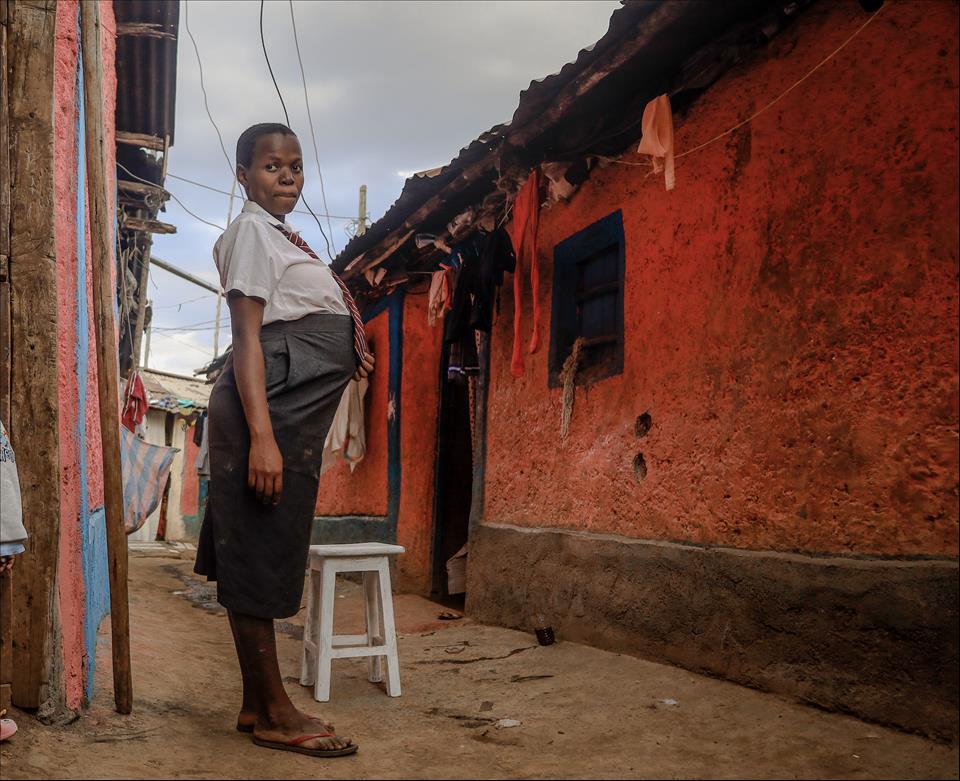
‛My Father Insisted That I Have The Baby, But Not In His House' Kenya's Teen Mums Lack Support
Even in instances where programmes are developed to help, they face pushback. Critics argue that such support would inadvertently encourage more girls to become pregnant. Teenage mothers are painted as undeserving of such help because people attribute teenage mothers' circumstances to personal choices and overlook the effects of the broader structural factors that shape their situation.
This isn't helpful. Teenage pregnancy rates in Kenya are high. About 15.3% of adolescent girls start childbearing before the age of 18 years. The global figure is estimated at 13% .
This proportion is much higher (27%) in Nairobi's slums, which are characterised by overcrowding, chronic poverty, poor infrastructure, crime and violence.
We conducted a study in a slum in Nairobi to understand why teen mums were being socially excluded before and after pregnancy, along with the implications for their health and socioeconomic situation.
We found that adolescent girls and young women weren't being given the tools they needed to prevent pregnancy, like education or contraception. Once they were pregnant, some were rejected at home, abandoned by their partners, and excluded from schools and community. If these girls are not better supported, they will miss out on empowerment opportunities and end up poor.
It's essential to focus both on preventing teenage pregnancies and supporting young mothers.
Support before pregnancyWe carried out a study involving 594 pregnant and parenting girls aged 15-19 years. We conducted in-depth interviews with 22 of these girls and also spoke to their parents, key informants (including teachers), policymakers, community leaders, non-governmental organisation representatives and health workers.
Our study found that young women weren't getting the support or guidance to prevent pregnancy.
Many of their parents worked in domestic or menial jobs with long hours and low wages, while some were unemployed. Due to their precarious employment and long hours away from home, they were unable to adequately provide for and supervise their daughters.
One young girl told us:
Adolescent girls from such poor families sometimes engaged in sex with men, expecting money, food and gifts in return. Their typical partners were young men working menial jobs, such as boda-boda (motorbike) riders, garbage collectors, car washers, casual labourers in construction projects and plumbers.
We asked these girls why they did not use contraceptives to prevent their pregnancies, despite not wanting to become pregnant. They explained that they lacked accurate information about contraceptive methods, having not been taught about them, and only learned about them after becoming pregnant.
These girls didn't get accurate sexual and reproductive health information at home and at school. At home, parents didn't talk to them. At school, there was a lack of sex education.
These factors increased their vulnerability to early and unintended pregnancies.
Support after pregnancyThe girls interviewed recounted that their parents reacted harshly to the news of their pregnancies, becoming verbally and physically abusive. In extreme cases, some were even chased away from home, as one girl shared:
Some girls chose to move in with their boyfriends to escape emotional and verbal abuse from their parents. They also faced rejection from partners, friends and the community. They were ridiculed and labelled as a bad influence, with parents warning their daughters to dissociate from them.
As a result, pregnant girls sometimes isolated themselves, avoiding interaction within the community. They refrained from attending church or clinics for antenatal care and only ventured out in the dark or disguised their pregnancy when they had to go out during the day. They're often expelled or withdrawn from schools.
Most expressed feelings of shame, stress and constant sadness. The burden of rejection from home and the community, combined with feelings of sadness, disappointment and shame, severely affected their mental health. Some reported suicide attempts.
StigmatisationSelf-isolation was a coping mechanism, but it led to many missing out on antenatal care, which is crucial for identifying early pregnancy danger signs and reducing the risk of birth complications and maternal death.
Only one in three of 594 pregnant and parenting adolescents we surveyed (34.6%) completed four antenatal care visits, and approximately 3% completed eight visits as many were in their third trimester before initiating antenatal care.
Their exclusion from school affected their economic empowerment. Many of these girls were out of school and vocational training. A few worked in low-paid, menial jobs.
If the exclusion of adolescent mothers is not addressed, efforts to achieve economic empowerment and gender equality, as outlined in the sustainable development goals, will not succeed. Therefore, it is imperative to focus not only on preventing adolescent pregnancy but also on supporting and empowering adolescent mothers.

Legal Disclaimer:
MENAFN provides the
information “as is” without warranty of any kind. We do not accept
any responsibility or liability for the accuracy, content, images,
videos, licenses, completeness, legality, or reliability of the information
contained in this article. If you have any complaints or copyright
issues related to this article, kindly contact the provider above.














Comments
No comment